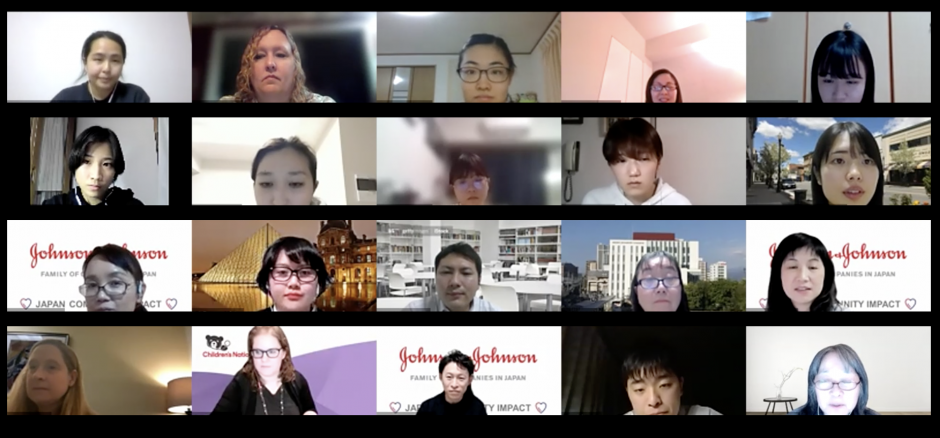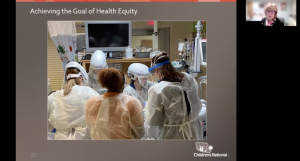TOMODACHI J&J Disaster Nursing Training Program Learns from U.S. Healthcare Professionals on Pandemic Response and Latest Disaster Nursing Areas

On March 27, 2022, the final debriefing session for the 2021 TOMODACHI J&J Disaster Nursing Training Program was held online. The six-month program concluded with the participation of approximately 60 people, including the eight nursing students who participated in the program, as well as other interested individuals.
The program consists of three major parts: Pre-Trip Seminar, U.S. Study Tour, and Post-Trip Seminar. Due to the impact of COVID-19, from October 2021, this year’s program ran completely online. After six days of the Pre-Trip Seminar, participants engaged in the online U.S. Study Tour for nine days from February 14 to 25, 2022. During the program, participants learned from many experts in a wide range of subjects such as disaster nursing and response in the United States, mental health and self-care among healthcare professionals, and response to the COVID-19 outbreak. On the last day of the training, February 25th, Ms. Chikage Kida, representing the program participants, gave a presentation on what motivated her to pursue a career in disaster nursing and what she learned from the training. Ms. Kida said that during the U.S. Study Tour she was particularly impressed by the “importance of disaster prevention measures” and “mental health care for supporters and self-care for medical personnel”. Along with this, she concluded by saying, “Without forgetting what I have learned (at U.S. Study Tour), I would like to continue discussing with the teachers who are my mentors and deepen my understanding of disaster nursing. Also, I would like to be able to present the things I’ve learned, I would like to create opportunities to learn about disaster nursing and be able to give back my knowledge to others.”
The Post-Trip Seminar, the final training of the program, was held on March 5 and 6, 2022. With the cooperation of Ms. Sonoe Mashino, Director of the Institute for Community Care and Development, University of Hyogo, the participants learned more about leadership, evacuation centers, and their roles in times of disaster. Through group work on the themes of “leadership”, “shelter environment and health, and the role of nursing,” participants shared their knowledge and learning with each other. They earnestly engaged in the exercises through trial and error.
 On March 27, 2022, the final debriefing took place. It was meaningful, including not only presentations by the participating students but also a panel discussion by mentor professors and speakers from the United States. The representative of the participants was Mr. Ryo Asahi from Nagaoka Sutoku University, who spoke about the need to help the victims to draw out their strengths and to consider whether the support is one-sided and self-satisfying. Individual presentations showed the change of heart of Ms. Ayano Sakurai, from Tokyo Medical and Dental University, who said, “My interest in mental health care, which I had not paid much attention to before, has expanded and I want to gain a wider range of values and knowledge.”
On March 27, 2022, the final debriefing took place. It was meaningful, including not only presentations by the participating students but also a panel discussion by mentor professors and speakers from the United States. The representative of the participants was Mr. Ryo Asahi from Nagaoka Sutoku University, who spoke about the need to help the victims to draw out their strengths and to consider whether the support is one-sided and self-satisfying. Individual presentations showed the change of heart of Ms. Ayano Sakurai, from Tokyo Medical and Dental University, who said, “My interest in mental health care, which I had not paid much attention to before, has expanded and I want to gain a wider range of values and knowledge.”


